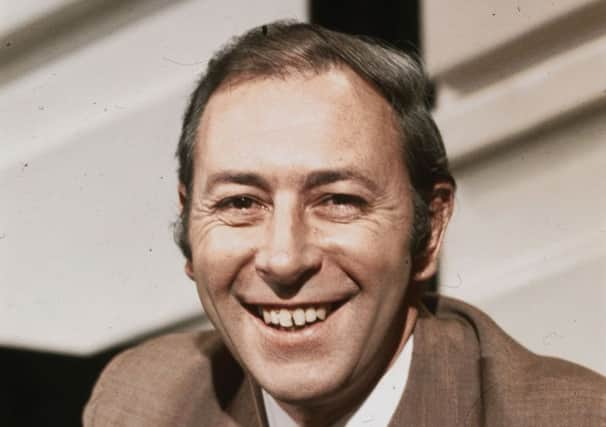Obituary: David Coleman OBE, sports commentator


For almost 50 years, David Coleman commentated on or presented many of the major sporting events on BBC TV. It was the days when the corporation had a virtual monopoly on football and athletics and Coleman oversaw them with an expert eye. He fronted such widely watched programmes as the iconic Saturday afternoon Grandstand, Sportsnight and was a host on A Question of Sport, which he presented for 18 years. Coleman struck up a close relationship with the team captains, especially Bill Beaumont and Ally McCoist, and the jovial atmosphere – full of sporting banter and goodwill – helped to make the programme hugely popular.
It was the range of programmes that Coleman covered that made him respected by the public. His love of sport and its traditions, coupled with his wide knowledge, shone through on every broadcast. The great names were willing to be interviewed by Coleman – they knew he would be well-prepared and ask informed questions. However, he had on occasions, the knack of, putting his foot in it and made some hilarious gaffes – many of which soon became affectionately known as Colemanballs.
Advertisement
Hide AdAdvertisement
Hide AdThere was no doubting his professionalism and ability to capture the atmosphere or the finer points of a match. With his broad grin, slightly northern accent and, in winter, always wearing a woollen-lined duffle coat, Coleman was an integral part of Saturday afternoons in many households. For many, Coleman was the voice of sport on television.
His minute preparation before international events was legendary: he had the most unlikely facts at his fingertips – as was evidenced once while the teleprinter was bashing out the football results on Grandstand. Coleman was heard to say with a breathless enthusiasm: “Queen of the South 1, Airdrie 1, means Airdrie move up three places on goal difference, but Queen of the South slip a place because Brechin won today.”
David Coleman attended a grammar school in Cheshire while displaying considerable ability as a middle-distance runner. His first job was as a reporter on the Stockton Express.
After doing his National Service with the army’s newspaper unit, where he saw service in Germany and Africa, he returned to local journalism. He continued to enjoy athletics, winning the annual Manchester Mile. An injury, however, prevented him from continuing at senior level.
He joined the BBC in 1952 and was given various high-profile interviews – which he carried out with a natural authority. Such was his ease in front of the camera, he was offered, in 1958, a contract to present the BBC’s new flagship show, Grandstand. In fact Peter Dimmock introduced the first edition of Grandstand as head of BBC Sports. With much generosity, he then handed over to Coleman, “who” Dimmock quipped “is 20 times better at it than me”.
It had been a meteoric rise and over the next half-century Coleman was to remain loyal to the organisation and become one of its most recognisable and respected figures. In all, Coleman did 60 Grandstands a year for ten years, then almost as many Matches of the Day. Grandstand was a major challenge – it often ran for more than four hours and covered five sporting fixtures. Coleman said it took him 16 hours of intensive preparation during the week.
Coleman played a pivotal role at 16 Summer and Winter Olympics, six World Cups, numerous Grand Nationals, the return of the Beatles from the US and fronted a general election night. It was an extraordinarily diverse career. But Coleman was always a thoroughly professional journalist, who displayed a sensitive and dramatic authority at the 1972 Munich Olympics. The proceedings had been hijacked when Arab terrorists invaded the Olympic Village, taking hostages and killing 11 Israeli athletes. Coleman continued broadcasting for 24 hours and provided a clear and concise picture of the mounting – and involved – political drama.
Many will recall his unflustered and straight-forward commentaries. His voice could certainly rise and become much animated (his delivery was once dubbed, “a gurglingly intense cadence”), but Coleman was adroit at never taking over. He did not indulge in gimmicks or catch-phrases: the sport was the thing. That, however, did not mean there were not gaffes.
Advertisement
Hide AdAdvertisement
Hide AdPrivate Eye had a column of Colemanballs, which provided endless amusement. Such as: “That’s the fastest time ever run, but it’s not as fast as the world record” and “He is one of the great unknown champions because very little is known about him”. And the delightful: “For those of you watching who do not have television sets, live commentary is on Radio 2.”
But no-one could ever doubt Coleman’s enthusiasm and sincerity. His down-to-earth manner and sheer mastery of his subject set a standard for BBC sports coverage for three decades. But he could be lacerating in his condemnation if sportsmen (especially footballers) did not measure up to his expectations. As the infamous 1962 World Cup match between Chile and Italy deteriorated into an unseemly brawl, Coleman described the scene as: “The most stupid, appalling, disgusting and disgraceful exhibition of football, possibly in the history of the game.”
Beaumont said of his friend: “David set the standards. His enthusiasm and love of knowledge always came through. He could tell you how many games Cowdenbeath had won and all sorts of things. The only things that changed on the programme were that his parting got wider and his sweaters got worse.”
Coleman is survived by his wife Barbara, and their three daughters and three sons.